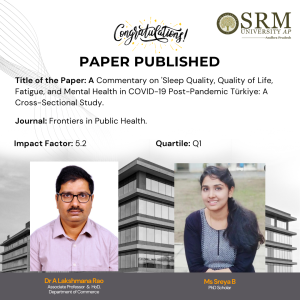 We are thrilled to announce that Dr A Lakshmana Rao, Associate Professor from the Department of Commerce along with Ms Sreya B, a distinguished PhD Scholar, have made a significant contribution to the field of public health with their latest publication.
We are thrilled to announce that Dr A Lakshmana Rao, Associate Professor from the Department of Commerce along with Ms Sreya B, a distinguished PhD Scholar, have made a significant contribution to the field of public health with their latest publication.
Their paper, titled “A Commentary on ‘Sleep Quality, Quality of Life, Fatigue, and Mental Health in COVID-19 post-pandemic Türkiye: A Cross-Sectional Study’,” has been published in the esteemed journal Frontiers in Public Health, which boasts an impressive impact factor of 5.2.
This groundbreaking study delves into the crucial aspects of sleep quality, quality of life, fatigue, and mental health in the aftermath of the COVID-19 pandemic in Türkiye. The research provides insightful commentary and analysis, contributing valuable knowledge to our understanding of the pandemic’s long-term effects on human well-being.
The SRM University-AP community is proud of Dr Rao and Ms Sreya B for their dedication and excellence in research. Their work not only enhances the reputation of our institution but also serves as an inspiration for our students and faculty alike.
We congratulate them on their achievement and encourage our readers to access the full paper to learn more about the study’s findings and implications for public health.
Abstract
This commentary examines the impact of the COVID-19 pandemic on mental health and sleep quality among the Turkish population, focusing on socio-demographic disparities and gender-based differences. To investigate the lasting effects of the pandemic, a comprehensive cross-sectional, multi-center-based survey was conducted in 2022. The study used robust sampling strategies and validated assessment tools such as WHOQOL-BREF, PHQ-15, DASS-21, GAD-7, PSQI, and FAS to reveal significant associations between poor sleep quality and worsened mental health.
The findings highlight the need for targeted interventions post-pandemic. The study conducted a detailed analysis, including multivariate regression, to explore the interaction between socio-demographic factors, mental health, and sleep quality, providing valuable insights for future public health interventions that consider both socio-demographic characteristics and lifestyle factors. In conclusion, the study advocates prioritising interventions that enhance sleep quality as a crucial aspect of post-pandemic public health, offering potential avenues for mitigating mental health disorders. Despite acknowledged limitations, the research’s contributions to understanding post-pandemic mental health challenges underscore its relevance in shaping targeted public health interventions.
Explanation of the Research in Layperson’s Terms
This article discusses a research study conducted in Turkey to investigate the impact of the COVID-19 pandemic on people’s sleep, quality of life, fatigue, and mental health. The study discovered that numerous individuals experienced sleep problems and mental health disorders following the pandemic, likely due to stress and social isolation. It suggests that enhancing sleep quality could help to improve mental health in the future, emphasising the significance of addressing these issues in public health strategies.
Title of Research Paper in the Citation Format
Sreya B, Lakshmana Rao A, (2024) Commentary: Sleep quality, quality of life, fatigue, and mental health in COVID-19 post-pandemic Türkiye: a cross-sectional study. Front. Public Health 12:1393054. Doi: 10.3389/fpubh.2024.1393054
Practical Implementation or the Social Implications Associated with the Research
The findings of the research have significant practical and social implications for addressing the impact of the COVID-19 pandemic on the Turkish population. The study underscores the importance of targeted interventions aimed at improving sleep quality to mitigate long-term mental health challenges. These interventions might involve stress management programs, education on sleep hygiene, and increased access to mental health services. Furthermore, optimising healthcare resource allocation by prioritising mental health services and sleep disorder clinics could enhance support for individuals struggling with mental health issues.
Public health campaigns focusing on the importance of sleep for mental well-being could raise awareness and promote strategies for improving sleep quality across various demographic groups. Additionally, the research helps reduce stigma around mental health by highlighting the prevalence of mental health symptoms and sleep disturbances post-pandemic, encouraging more individuals to seek support without fear of judgment. Moreover, recognising the impact of social isolation on mental health and sleep quality underscores the importance of fostering social support networks and community connections to aid in post-pandemic recovery.
Policy development informed by the research findings could address broader social determinants of health, such as housing insecurity and access to healthcare, to create a more supportive environment for mental health and sleep quality improvement initiatives. Overall, integrating mental health and sleep quality considerations into post-pandemic recovery efforts is crucial for promoting the overall well-being of the Turkish population.

